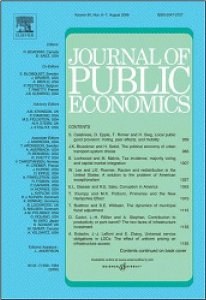
Reuben, E. and van Winden, F. (2008). Social ties and coordination on negative reciprocity: The role of affect Journal of Public Economics, 92:34--53.
-
Affiliated authorsErnesto Reuben, Frans van Winden
-
Publication year2008
-
JournalJournal of Public Economics
This is an experimental study of negative reciprocity in the case of multiple reciprocators. We use a three-player power-to-take game where a proposer is matched with two responders. We compare a treatment in which responders are anonymous to each other (strangers) with one in which responders know each other from outside the lab (friends). We focus on the responders' decisions, beliefs, and emotions. Our main findings are (1) friends punish the proposer more than strangers, (2) friends are more likely to coordinate their punishment (without communication), and (3) both punishment and coordination are explained by the responders' emotional reactions.